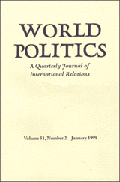Although the case-based literature suggests that kin groups are prominent in ethnonationalist conflicts, quantitative studies of civil war onset have both overaggregated and underaggregated the role of ethnicity, by looking at civil war at the country level instead of among specific groups and by treating individual countries as closed units, ignoring groups' transnational links. In this article the authors integrate transnational links into a dyadic perspective on conflict between marginalized ethnic groups and governments. They argue that transnational links can increase the risk of conflict as transnational kin support can facilitate insurgencies and are difficult for governments to target or deter. The empirical analysis, using new geocoded data on ethnic groups on a transnational basis, indicates that the risk of conflict is high when large, excluded ethnic groups have transnational kin in neighboring countries, and it provides strong support for the authors' propositions on the importance of transnational ties in ethnonationalist conflict.
Cederman, Lars-Erik; Kristian Skrede Gleditsch & Luc Girardin (2009) Ethnonationalist Triads: Assessing the Influence of Kin Groups on Civil Wars, World Politics 61 (3): 403–437.








